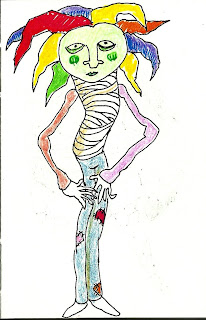
Here is what I am supposed to be learning: when people reject me, that doesn’t make me an unworthy, pathetic loser.
So I write a novel, and not one person in my family reads it. I give siblings paintings, and they re-gift them. A group with which I was deeply involved, a group in which I thought I was loved, suddenly rejects me and asks me to leave. Someone who loves me, like a lover, actually loves me like a favorite cousin. These disappointments tend to precede my deep feelings of worthlessness. I feel like a loser, unlovable, unlikeable, stupid, worthless, naïve, but I’m supposed to be learning that when I get rejected it is not evidence that I am a worthless being. In the past I jumped to the conclusion that when I am not cared about, it means I am not worth caring about, that God is wasting air on me.
I am willing to accept the hypothesis that just because someone doesn’t value me, does not mean I am valueless.
What I can’t seem to accept is that while rejection does not automatically equal worthlessness, I still believe that rejection CAN be evidence that I’m not cared about because there is nothing about me worth caring about.
Somewhere in my mind comes this idea that there is really very little advantage to me thinking I’m a loser worth a little less than a bucket of spit. I would do better if I had a positive attitude.
Here is a question: Is it OK, or smart to believe that I should have a positive attitude, I should look on the bright side, should I believe in my worthiness even if it’s not true? I mean, can I lie to myself, and end up liking myself?
A shrink might say, “It’s not a lie. You are worthy. When you were born no one stamped your forehead with indelible ink forming the single word, UNWORTHY! Every child is born with priceless value, and it doesn’t go away once you get pull-ups.”
It is a little like a little girl crying because she thinks she looks ugly with braces and black framed glasses, and her mother side beside her on the bed and says, “No, no, honey. You’re beautiful. If that boy doesn’t know it, well, it’s his loss.”
It just seems to me like if you have value, you would be valued. Your drawings would go up on the refrigerator. Your family would come to the awards ceremony and be thrilled with your honorable mention. They would miss me if I were gone. Someone would want you the way you want to be wanted. Sometimes you want to be loved as a lover and not as a really close friend. Sometimes you want your family to value what you create.
Back to my question: What if I am the ugly, dumb, untalented person that I feel I am? Might my survival be more likely if I lied to myself? If I believe in me even without the evidence wouldn’t I be happier, and more hopeful?
Set your minds on things above. . .
Colossians 3:2
I work with people who often live in poverty, have little education, and often they are mentally slow. I have had people in their thirties, people living in a camper trailer, people who read on a third grade level tell me that they are going to get their GED, go to the community college and eventually they are going to be a lawyer.
I know that human potential cannot be assessed with any degree of certainty, and people with disadvantages have sometimes achieved great success, but you don’t place your bet on a learning disabled person raised in poverty. While success is possible, it isn’t likely. In my view their success is unlikely. These people just don’t see how huge the obstacles are to achieve their goals. These people do not realize how much they don’t know, or how difficult it is going to be to develop the skills they need to achieve success.
Then I wonder, “Maybe I am just as clueless and they are.”
Would these people be happier knowing that there hopes and dreams are so out of reach that only one in ten million will succeed?
Many in this world live with illusions. They think someone all-powerful is going to manipulate events to give you what you ask for if you ask right, if you have faith, or if you believe totally and with no hint of doubt. Some believe there is power in positive thinking. Some people think they can be better if they lie to themselves.
A shrink might tell me that what I believe about myself is not the truth.
To tell you the truth, I have no clue how to assess myself. I don’t know if I would recognize the truth if I were hit in the face with it. I feel worthless, but maybe I am worthless and worthy. I feel like a loser, but maybe I am a loser and a winner. I feel like a low functioning rube who has no grasp on what life is really like, but maybe I’m smart and perceptive. I feel like positive thinking is just me telling lies to me, but a feeling is not a fact. But maybe I’m wrong. Maybe being ignored by some, rejected by others is their problem and not mine.
I must live with being ignored, and rejected. I might have to live with disappointment. I must exist with frustrations. At times I must live with people hating me, aggressively seeking my failure, but maybe this dolor environment is just how it is, and if the whole world could care less about me, maybe I still have a right to good things.
Now, my next thought: Let’s say I have a right to good things, that joy belongs to me, that I am valuable, but the care I want, the esteem I long for, the love I yearn for is just not going to come to me. How do I live with self-worth in the midst of disregard, and rejection?





